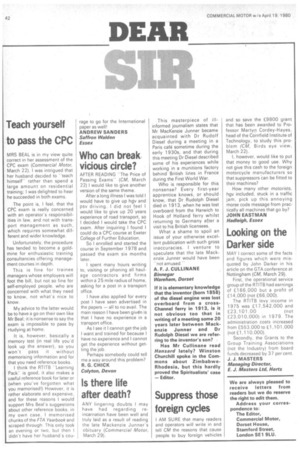DEAR
Page 44

If you've noticed an error in this article please click here to report it so we can fix it.
Teach yourself to pass the CPC
MRS BEAL is in my view quite correct in her assessment of the CPC exam (Commercial Motor, March 22). I was intrigued that her husband decided to "teach himself rather than spend a large amount on residential training; I was delighted to hear he succeeded in both exams.
The point is, I feel, that the CPC exam is really concerned with an operator's responsibilities in law, and not with transport management as such, which requires somewhat different and wider knowledge.
Unfortunately, the procedure has tended to become a goldmine for enthusiastic training consultancies offering management courses in depth.
This is fine for trainee managers whose employers will foot the bill, but not so fine for self-employed people, who are concerned with what they need to know, not what's nice to know.
My advice to the latter would be to have a go on their own like Mr Beal; it is nonsense to say the exam is impossible to pass by studying at home.
It is, however, basically a memory test (in real life you'd look up the answer), so you won't pass it without memorising information and for that you need reference books.
I think the RTITB -Learning Pack" is good, it also makes a useful reference book for later or (when you've forgotten what you memorised!) However, it is rather elaborate and expensive, and for these reasons I would support Mrs Beal's suggestions about other reference books, in my own case, I memorised chunks of the FTA Yearbook and scraped through. This only took an evening or two, but then I didn't have her husband's cou
rage to go for the International paper as well!
ANDREW SANDERS Saffron Walden Essex
Who can break vicious circle?
AFTER READING "The Price of Passing Exams" (CM, March 22) I would like to give another version of the same theme.
After a long illness I was told I would have to give up hgv and psv driving. I did not feel I would like to give up 20 years experience of road transport, so I decided I would take the CPC exam. After inquiring I found I could do a CPC course at Exeter College of Further Education.
So I enrolled and started the course in September 1978 and passed the exam six months later.
I spent many hours writing to, visiting or phoning all haulage contractors and firms within a 25 mile radius of home, asking for a post in a transport office.
I have also applied for every post I have seen advertised in the papers — all to no avail. The main reason I have been givdn is that I have no experience in a transport office.
As I see it I cannot get the job I want and trained for because I have no experience and I cannot get the experience without getting the job.
Perhaps somebody could tell me a way around this problem? R. G. CHICK Colyton, Devon
Is there life after death?
ANY lingering doubts I may have had regarding reincarnation have been well and truly laid as a result of reading the late Mackenzie Junner's obituary (Commercial Motor, March 29). This masterpiece of illinformed journalism states that Mr MacKenzie Junner became acquainted with Dr Rudolf Diesel during a meeting in a Paris café sometime during the early 1930s, and that during this meeting Dr Diesel described some of his experiences while working in a munitions factory behind 'British lihes in France during the First World War.
Who is responsible for this nonsense? Every first-year apprentice knows, or should know, that Dr Rudolph Diesel died in 1913, when he was lost overboard from the Harwich to Hook of Holland ferry whilst returning to Germany atter a Visit to his British licensees.
What a shame to spoil an issue of your otherwise excel lent publication with such gross inaccuracies. I venture to speculate that the late Mackenzie Junner would have been "not amused."' A. F. J. CULLINANE Binnegar Wareham, Dorset If it is elementary knowledge that the inventor (born 1858) of the diesel engine was lost overboard from a crossChannel ferry in 1913, is it not obvious too that in writing of a meeting some 20 years later between Mackenzie Junner and Dr Rudolph Diesel we are referring to the inventor's son? • Has Mr Cullinane read Hansard lately? Winston Churchill spoke in the Commons about ZimbabweRhodesia, but this hardly proved the Spiritualists' case — Editor.
Suppress those foreign cycles
I AM SURE that many readers and operators will write in and tell CM the reasons that cause people to buy foreign vehicles and so save the £9800 grant that has been awarded to Professor Martyri Cordey-Hayes, head ofthe Cornfield Institute of Technology, to study this problem (CM, Birds eye view, March 22).
I, however, would like to put that money to good use. Why not give this cash to the foreign motorcycle manufacturers so that suppressors can be fitted to their machines?
How many other motorists, hgv included, stuck in a traffic jam, pick up this annoying morse code message from practically all machines that go by? JOHN EASTMAN Hadleigh, Essex
Looking on the Darker side
MAY I correct some of the facts and figures which were misquoted by John Darker in his article on the GTA conference at Nottingham (CM, March 29).
First, the operational service group of the RTITB had earnings of £166,000 but a profit of £14,000 (not £66,000).
The RTITB levy income in 1975 was £17,542,000 and £23,101,00 (not £23,010,000) in 1979. The administration costs increased from £553,000 to £1,101,000 (not £1,110,000).
Secondly, the Grants to the Group Training Associations (not the Industry) from board funds decreased by 37 per cent. J. J. MASTERS Managing Director, E. J. Masters Ltd, Herts












































































































